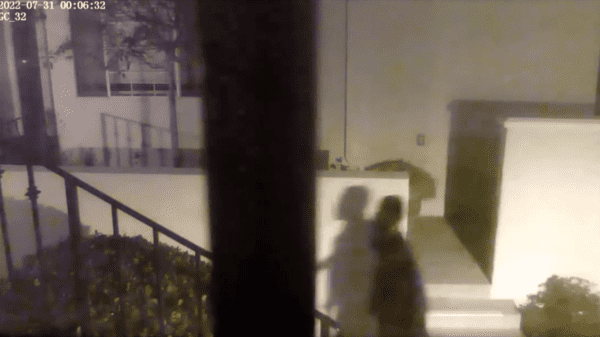An Anaheim police officer lied in a report to justify searching a suspect’s vehicle following a traffic stop, a prosecutor told jurors Monday, but the defendant’s attorney said his client filed a “sloppy” report and did not intend to make false claims.
Dillon Adam Avila, 30, is charged with one felony count of a police officer filing a false report. Prosecutors dismissed a felony count of perjury on July 20, according to court records.
“What this case is about … is that as a society we expect and reward our sworn police officers to tell the truth and act with honesty and integrity,” Deputy District Attorney Jake Jondle said.
Avila and his partner at the time, Officer Samuel Silva, pulled over a suspect for expired registration on Walnut Street about 11 p.m. April 29, 2018, Jondle said.
Kevin Vincent Hodges, who was behind the wheel, and his passenger, Elizabeth Caro, were asked to get out of the 1991 Lexus they were in, according to court records.
Avila “falsely claimed Mr. Hodges gave consent for a search,” Jondle alleged.
Jondle showed jurors body-camera footage at the scene showing Hodges saying, “I’m not consenting” to a search of the Lexus.
At another time he is shown saying, “I told you I’m not consenting to the search.”
Avila is seen in the footage acknowledging Hodges’ statement.
“He says, `I know you said no to the searches,”‘ Jondle said.
Avila wrote in the report that Hodges consented to a search of his backpack, which led to evidence that resulted in Hodges being charged with possession of drugs for sale, Jondle said.
During a preliminary hearing for Hodges on Feb. 5, 2019, Availa testified that Hodges consented to the search of his car, Jondle said.
Hodges’ attorney, Stephan DeSales, argued in a motion to suppress evidence that Avila is recorded on bodycam video telling Hodges, “We heard you. You said you did not want us to search it.”
Hodges told the police officers he had many possessions in his car because he was in the process of moving and that he misplaced his wallet so he could not provide an ID to the officers, according to DeSales. The officers found his wallet and driver’s license before they searched the backpack and trunk, which led to the evidence resulting in the drug charges, DeSales said.
Prosecutors ultimately moved to dismiss the case against Hodges on Feb. 21, 2020.
Avila’s attorney, Michael D. Schwartz, told jurors Monday, “As a society we have to understand police officers are human beings, not robocops. … This case is not about a false police report. It’s about a sloppy, poorly written police report.”
The two officers were working the “graveyard shift” when they pulled over Hodges, who had been seen leaving a “known drug house” that dealt methamphetamine, Schwartz said.
Avila was busy talking to Caro as Silva dealt with Hodges, so Avila wasn’t always aware of what Hodges was saying to Silva at the time, Schwartz said.
Schwartz said the fact that Hodges could not produce his driver’s license could have led to an arrest on that alone. It would have also led to the car being towed and searched legally without the owner’s consent, Schwartz said.
The officers also spotted a knife in Hodges’ pocket, which also could have led to an arrest on the spot, Schwartz said. He said if they placed him under arrest for that they could have been authorized to search the car, but that law was changed in 2019, Schwartz said.
Silva searched the car while Avila kept an eye on the suspects, Schwartz said.
The search of the backpack yielded a small amount of drugs, and a search of the trunk led the officers to baggies of methamphetamine and a scale, Schwartz said.
When the officers asked to search the suspect’s phone, he did not want to let them, but he changed his mind when the officers said they would make him wait while they obtained a search warrant, Schwartz said.
Three character witnesses were scheduled to testify for Avila, including one who has been a friend of the officer since age 5, Schwartz said.
Avila is “one of the most honest people he knows,” Schwartz said.
“Any mistakes in that report are not intentional,” Schwartz said.







